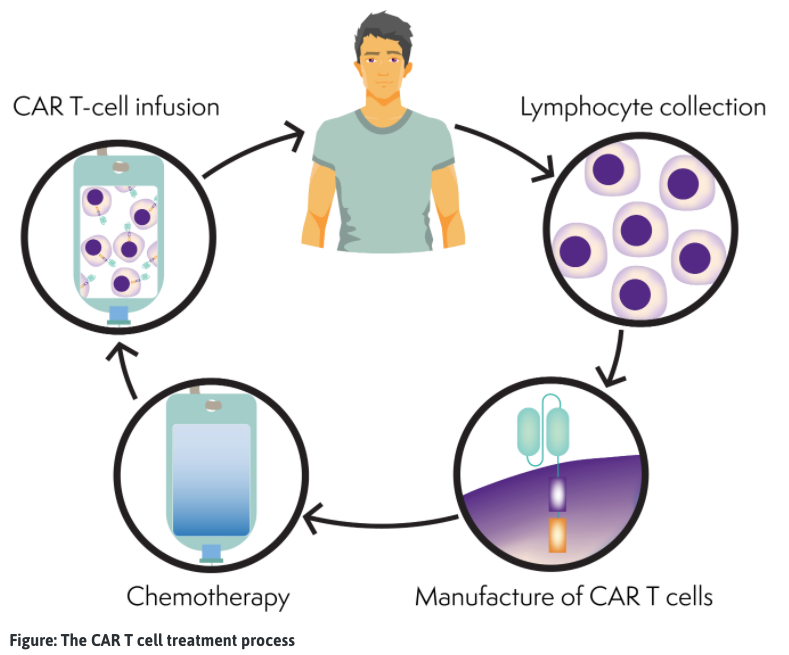Read more
Let’s break it down:

In CAR T-cell therapy, your T-cells are removed from your blood and sent to a lab where a scientist adds a CAR to them. This is why they are called CAR T-cells.
The CAR T-cells are then sent back to the hospital and infused back into your blood in a procedure like a blood transfusion. They then move into your lymphatic system and travel around your body, the CAR finds and sticks to the lymphoma cells, and the T-cell destroys them.
Our immune system protects us from infections and diseases, including cancers like lymphoma. It has special cells called white blood cells. These cells move through our blood and lymphatic system to every part of our body, finding and destroying things that don’t belong – like germs or cancer cells.
We have different types of white blood cells, each with a different job, but all protect us from infection and disease. Some of these are called lymphocytes. It is these white blood cells – the lymphocytes, that become cancerous in lymphoma.
Lymphocytes are also very important in CAR T-cell therapy because the T-cells are a type of lymphocyte.
Sometimes, lymphocytes cells stop working properly. They can grow too fast and live longer than they should. When this happens, it can lead to lymphoma, which is a type of cancer.
Lymphoma cells can also trick the immune system. They may hide from it or stop it from working well. That’s when special treatments like CAR T-cell therapy can help.
For a more detailed explanation of how our lymphatic & immune systems work together to protect us see Understanding your lymphatic & immune systems – Lymphoma Australia.
Lymphoma is often treated with chemotherapy or radiation. These treatments kill fast-growing cells, including lymphoma. But they can also harm healthy cells that grow quickly, like those in your mouth, or stomach and your hair.
Another kind of treatment is called immunotherapy. It helps your immune system find and destroy cancer cells without harming as many healthy ones. CAR T-cell therapy is a type of immunotherapy. Watch the 3-minute video below for an explanation of how CAR T-cells are made and work.
Special Note: Although your T-cells are removed from your blood for CAR T-cell therapy, most of our T-cells live outside of our blood – in our lymph nodes, thymus, spleen and other organs.
You need healthy T-cells to make CAR T-cells. For this reason, CAR T-cell therapy cannot be used if you have a T-cell lymphoma – yet.
For more information on CAR T-cells and T-cell lymphoma click here.
Please note:
Lymphoma Australia staff are only able to reply to emails sent in English language.